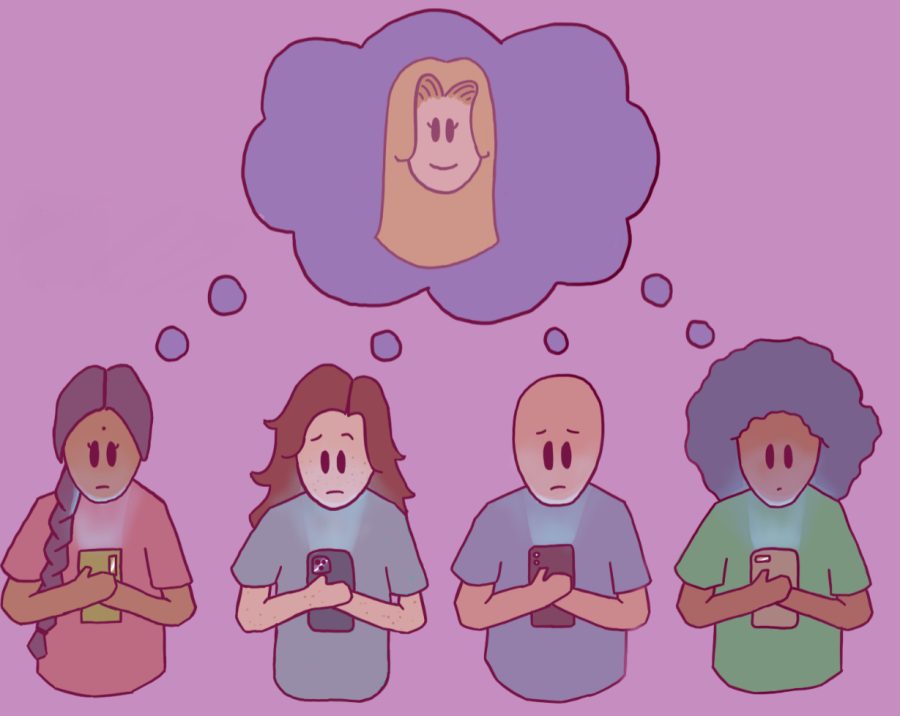Hidden danger
Social media perpetuating certain beauty standards
Beauty standards are highly prevalent in today’s society, thriving especially in social media. The Sidekick staff writer Nyah Rama talks about the harmful effects Eurocentric beauty standards can have on teenagers. Graphic by Nrithya Mahesh
February 1, 2023
“Oh my goodness she’s so beautiful, I wish I could look like her.”
“I should eat less and workout more, maybe then I’ll be as beautiful as she is.”
“I need a tiny nose and straight hair, I’d be perfect then.”
These are just a few of the millions of thoughts that have gone through teenagers minds, but often are not fleeting feelings.
Thoughts like these can signify much bigger body image issues, such as body dysmorphia, or lead to eating disorders, such as anorexia and bulimia.
What is leading to these thoughts though? Why are so many teenagers afflicted with body image issues and why is it teenagers specifically that are the most affected by it?
Social media is not the only reason teenagers fall prey to this line of thinking, but it is definitely a contributing factor.
Social media is designed to show people who you really are, but ever since its inception, people have used it to put out this “perfect” image of themselves rather than their actual identity.
One of the biggest ways social media has done this is through the usage of filters.
Platforms like Instagram, Snapchat and TikTok utilize a very Eurocentric beauty standard through their filters. A Eurocentric beauty standard is one which promotes American and European looks such as tiny noses, straight and shiny hair, prominent bone structure and lean figure steering away from more ethnic features like bigger lips and darker skin tones.
These filters alter your face to make your nose appear smaller, your hair seem straighter and your skin seem tighter or even lighter; overall, it tries to make your face seem tinier and demure. This can be damaging because teenagers then think that this is how you have to look to be beautiful and what makes it worse is that most influencers and celebrities tend to lean into that beauty standard like when Hailey Bieber did “brownie-glazed lips” and it immediately became a trend.
What is even worse is that people of color had been doing this for many years but only when Bieber did it did it become a big trend.
This perpetuates the narrative in teens minds, “if I don’t look like that I’m nothing.” It creates this idea that if we can’t make ourselves look a certain way we aren’t acceptable, both to ourselves and society.
“Social media definitely does promote a toxic beauty standard,” Coppell High School sophomore Chandana Pagadala said. “It’s impressionable and it gives off [a false idea] with all these influencers doing unrealistic things and having this impression on young kids, [specifically young girls] and that’s a very toxic thing. It teaches kids to not love who they are as themselves.”
The pressures of high school certainly do not ease the pain of this narrative either. The constant fear of judgment and glances can be overwhelming and it doesn’t help that our peers actually can create cultures of criticism. Teenagers can be so quick to judge, even as they’re all going through the same things. This can be the result of our own self hatred.
Teenagers will try so hard to project the “perfect” image of themselves onto the world through their social media, which not only makes those platforms the instigator, but the tool used to perpetuate our own narratives as well which can be extraordinarily damaging to our physical and mental health.
In addition to creating body image issues, social media can damage one’s sense of identity. Teenagers will spend all this time trying to look like or be like someone that they don’t act like themselves anymore, there is always some trend they’re trying to follow.
Social media is constantly showing you these unattainable ideals, which leads to teenagers who are so desperate for the narrative of “perfection” that they begin to live unhealthy lifestyles.
We have to remember that social media isn’t reality. It is just one big highlight reel of people trying to be something they’re not and calling it “perfection.”
Social media is also the source of a great deal of self–esteem issues. The constant comparison of ourselves to these unattainable “ideals” produces so much negativity in our minds.
In a world where teenagers are already comparing themselves to each other on a daily basis, the last thing we need is social media reminding us of how “inferior” we are.
The language that teens can use towards each other doesn’t help either, because even when teens do try and follow the trends on social media they can end up getting labeled with words like “basic” or a “tryhard.”
In this culture of negativity and body shaming, teens need to find ways to uplift each other and support one another instead of saying things like “you’re not that fat.”
We need to learn how to respect each other and how to talk to each other because social media and the rest of the world are already telling us that we aren’t good enough. The last place we need to hear it from is the ones closest to us.
Most importantly, we need to learn how to embrace ourselves for who we are because we are all so different and so beautiful.
Follow Nyah (@nyah_rama) and @CHSCampusNews on Twitter.











